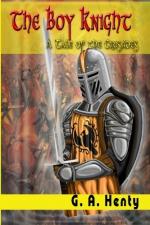Here and there, on elevated platforms, or even on the top of a pile of tubs, were friars occupied in haranguing the soldiers, and in inspiring them with enthusiasm for the cause upon which they were embarked. The conduct of their listeners showed easily enough the motives which had brought them to war. Some stood with clasped hands and eager eyes, listening to the exhortations of the priests, and ready, as might be seen from their earnest gaze, to suffer martyrdom in the cause. More, however, stood indifferently round, or, after listening to a few words, walked on with a laugh or a scoff; indeed, preaching had already done all that lay in its power. All those who could be moved by exhortations of this kind were there, and upon the rest the discourses and sermons were thrown away.
Several times in the course of his stroll round the camp Cuthbert observed the beginnings of quarrels, which were in each case only checked by the intervention of some knight or other person in authority coming past, and he observed that these in every instance occurred between men of the English and those of the French army.
Between the Saxon contingent of King Richard’s army and the French soldiers there could indeed be no quarrel, for the Saxons understood no word of their language; but with the Normans the case was different, for the Norman-French, which was spoken by all the nobles and their retainers in Britain, was as nearly as possible the same as that in use in France.
It seemed, however, to Cuthbert, watching narrowly what was going on, that there existed by no means a good feeling between the men of the different armies; and he thought that this divergence so early in the campaign boded but little good for the final success of the expedition.
When he returned to the tent the earl questioned him as to what he had seen, and Cuthbert frankly acknowledged that it appeared to him that the feeling between the men of the two armies was not good.
“I have been,” the earl said, “to the royal camp, and from what I hear, Cuthbert, methinks that there is reason for what you say. King Richard is the most loyal and gallant of kings, but he is haughty and hasty in speech. The Normans, too, have been somewhat accustomed to conquer our neighbors, and it may well be that the chivalry of France love us not. However, it must be hoped that this feeling will die away, and that we shall emulate each other only in our deeds on the battlefield.”
CHAPTER VI.
The lists.
The third day after the arrival of the Earl of Evesham there was a great banquet given by the King of France to King Richard and his principal nobles.
Among those present was the Earl of Evesham, and Cuthbert as his page followed him to the great tent where the banquet was prepared.
Here, at the top of the tent, on a raised dais, sat the King of France, surrounded by his courtiers. The Earl of Evesham, having been conducted by the herald to the dais, paid his compliments to the king, and was saluted by him with many flattering words.




